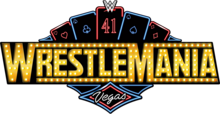
The evolution of Raw's sets
What’s the old saying? You never get a second chance at a first impression.
WWE has always taken this to heart, seeking to wow and amaze the WWE Universe each time they set foot into an arena or turn the TV to Monday Night Raw. Sports-entertainment’s flagship show has gone through many incarnations over the years, and so too has its entrance set. As Raw approaches its 1,000th episode, WWE.com presents a look back at the signature monolith’s earlier incarnations ( PHOTOS), from the humble beginnings of 1993, to the bombastic, high-definition glory of Raw SuperShow.
Take a look:
1993
The classics never truly die. When Raw premiered on January 11, 1993 ( PHOTOS: RAW EPISODES 1-100), the Manhattan Center in New York City was transformed into WWE’s personal haven every Monday night, with the Raw flags flying and an ornate ring of bright blue erected dead center. The setup was modest, but very fitting for WWE’s humble beginnings, and just extravagant enough to reflect the colorful personalities who fought between its ropes like Jerry “The King” Lawler and “Macho Man” Randy Savage.
1993-1995
As Raw started to grow, a little bit of innovation was called for. So a special entrance portal was created for Superstars to walk through on the way to their ring. Neither quite titanic nor tron-like, it’s fair to say this was the first step toward the set the WWE Universe has come to know and love.
1995-1997
Sometimes less is more, and some of the most iconic moments in WWE history happened in this no-frills entrance set. As WWE began to get grittier toward the late ’90s, the brutal simplicity of this set helped set the tone in sports-entertainment’s transition. Formerly a land of outsize personalities, the debuts of competitors like “Stone Cold” Steve Austin steered WWE into the rough-and-tumble phase it would come to thrive in during the Monday Night Wars.
1997-2002
What made this set special? A little thing called “Attitude.” This “TitanTron” loomed large throughout the Attitude Era, and apart from a few modifications here and there (extra screens and wirework, plus a sparkly new WWE.com logo), the design generally remained unchanged. To this day, it remains one of the signature elements of the Attitude Era.
2002-2005
Extravagance was the name of the game in the years following the Wars, as Raw switched networks in 2002 and went all-out in a complete overhaul of the TitanTrons for both Raw and SmackDown ( remember the fist?). Constructed to look like shards of steel and glass, the Raw set, gave off a vibe of pure industrial grit and afforded the red brand a sleek, high-tech upgrade from the sparseness of the previous set.
2005-2008
The more things change, the more they stay the same: Raw switched networks again in 2005 and generally kept the design of the existing Tron, with a few tweaks here and there: instead of the giant glass shards surrounding the stage, WWE opted for a stacked light structure that amped up the ambiance when the Superstars took to the ring.
2008-present
Now this looks familiar: On January 18, 2008, WWE switched to a universal TitanTron model for both Raw and SmackDown. The new Tron incorporated high-definition, LED lighting to correspond with WWE's first foray into HD broadcasting. According to veteran set engineer Jason Robinson, the entire structure was comprised of video screens that could be incorporated into every Superstar's entrance so the set could, for a moment, become an extension of their personality and not just a prop. The WWE Universe should be well-versed with this TitanTron; it’s been the standard for WWE for the past three years. CM Punk delivered his pipe bomb on this TitanTron, and it’s on this set that Raw will celebrate its 1,000th episode … unless, of course, the stage evolves again.
WWE Shows Latest Results
Raw results, April 7, 2025: Rollins ignites a brawl with Punk that leads to a cryptic statement by The Visionary
Full ResultsSmackDown results, April 4, 2025: CM Punk cashes in his favor and puts Roman Reigns to sleep
Full ResultsWWE NXT results, April 1, 2025: AND NEW! Ricky Saints wins the NXT North American Championship
Full Results































--de3612b9543981440a24489e0e568d9b.png)
--79a9936ef855901b63425f6f3430ca6c.jpg)




